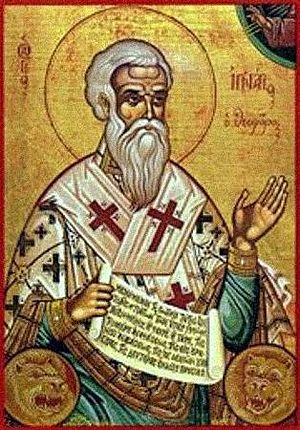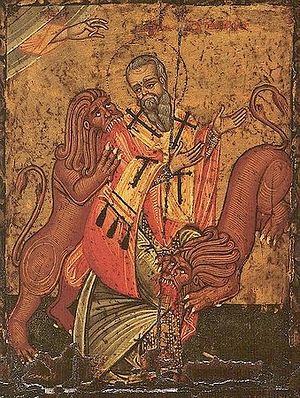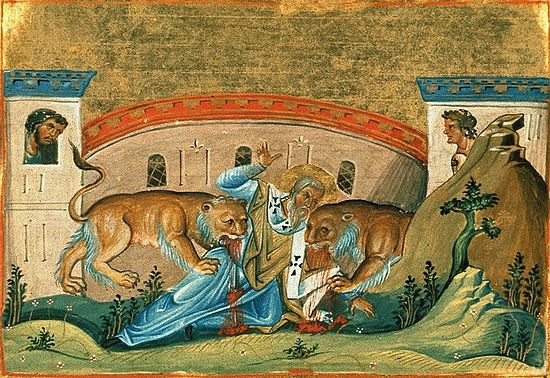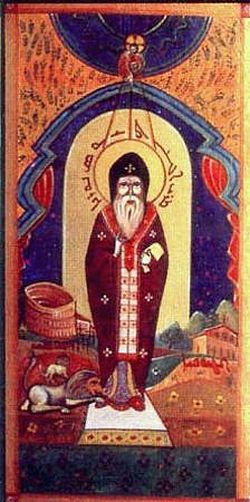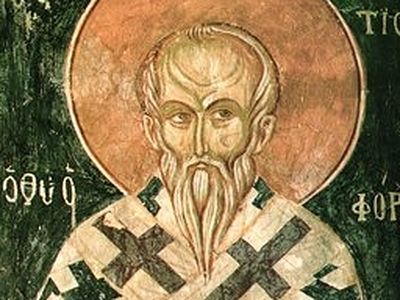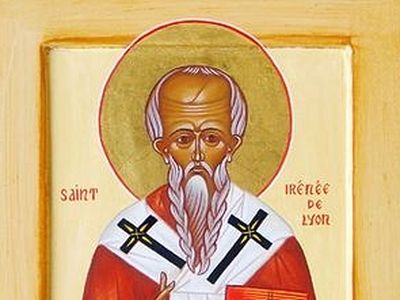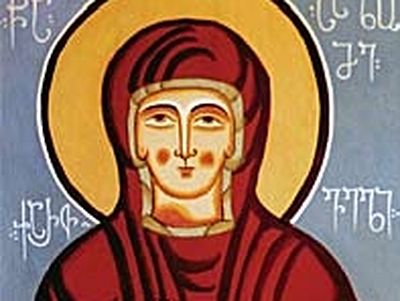Eulogy. On the holy martyr Saint Ignatius, the god-bearer, archbishop of Antioch the great, who was carried off to Rome, and there suffered martyrdom, and thence was conveyed back again to Antioch.
1. Sumptuous and splendid entertainers give frequent and constant entertainments, alike to display their own wealth, and to show good-will to their acquaintance. So also the grace of the Spirit, affording us a proof of his own power, and displaying much good-will towards the friends of God, sets before us successively and constantly the tables of the martyrs. Lately, for instance, a maiden quite young, and unmarried, the blessed martyr Pelagia, entertained us, with much joy. Today again, this blessed and noble martyr Ignatius has succeeded to her feast. The persons are different: The table is one. The wrestlings are varied: The crown is one. The contests are manifold: The prize is the same. For in the case of the heathen contests, since the tasks are bodily, men alone are, with reason, admitted. But here, since the contest is wholly concerning the soul, the lists are open to each sex, for each kind the theatre is arranged. Neither do men alone disrobe, in order that the women may not take refuge in the weakness of their nature, and seem to have a plausible excuse, nor have women only quitted themselves like men, lest the race of men be put to shame; but on this side and on that many are proclaimed conquerors, and are crowned, in order that you may learn by means of the exploits themselves that in Christ Jesus neither male nor female (Gal. 3:28), neither sex, nor weakness of body, nor age, nor any such thing could be a hindrance to those who run in the course of religion; if there be a noble readiness, and an eager mind, and a fear of God, fervent and kindling, be established in our souls. On this account both maidens and women, and men, both young and old, and slaves, and freemen, and every rank, and every age, and each sex, disrobe for those contests, and in no respect suffer harm, since they have brought a noble purpose to these wrestlings. The season then already calls us to discourse of the mighty works of this saint. But our reckoning is disturbed and confused, not knowing what to say first, what second, what third, so great a multitude of things calling for eulogy surrounds us, on every side; and we experience the same thing as if any one went into a meadow, and seeing many a rosebush and many a violet, and an abundance of lilies, and other spring flowers manifold and varied, should be in doubt what he should look at first, what second, since each of those he saw invites him to bestow his glances on itself. For we too, coming to this spiritual meadow of the mighty works of Ignatius, and beholding not the flowers of spring, but the manifold and varied fruit of the spirit in the soul of this man, are confused and in perplexity, not knowing to which we are first to give our consideration, as each of the things we see draws us away from its neighbours, and entices the eye of the soul to the sight of its own beauty. For see, he presided over the Church among us nobly, and with such carefulness as Christ desires. For that which Christ declared to be the highest standard and rule of the episcopal office, did this man display by his deeds. For having heard Christ saying, the good shepherd lays down his life for the sheep (Jn. 10:11), with all courage he did lay it down for the sheep.
He held true converse with the apostles and drank of spiritual fountains. What kind of person then is it likely that he was who had been reared, and who had everywhere held converse with them, and had shared with them truths both lawful and unlawful to utter, and who seemed to them worthy of so great a dignity? The time again came on, which demanded courage; and a soul which despised all things present, glowed with Divine love, and valued things unseen before the things which are seen; and he lay aside the flesh with as much ease as one would put off a garment. What then shall we speak of first? The teaching of the apostles which he gave proof of throughout, or his indifference to this present life, or the strictness of his virtue, with which he administered his rule over the Church; which shall we first call to mind? The martyr or the bishop or the apostle. For the grace of the spirit having woven a threefold crown, thus bound it on his holy head, yea rather a manifold crown. For if any one will consider them carefully, he will find each of the crowns, blossoming with other crowns for us.
2. And if you will, let us come first to the praise of his episcopate. Does this seem to be one crown alone? Come, then, let us unfold it in speech, and you will see both two, and three, and more produced from it. For I do not wonder at the man alone that he seemed to be worthy of so great an office, but that he obtained this office from those saints, and that the hands of the blessed apostles touched his sacred head. For not even is this a slight thing to be said in his praise, nor because he won greater grace from above, nor only because they caused more abundant energy of the Spirit to come upon him, but because they bore witness that every virtue possessed by man was in him. Now how this is, I tell you. Paul writing to Titus once on a time— and when I say Paul, I do not speak of him alone, but also of Peter and James and John, and the whole band of them; for as in one lyre, the strings are different strings, but the harmony is one, so also in the band of the apostles the persons are different, but the teaching is one, since the artificer is one, I mean the Holy Spirit, who moves their souls, and Paul showing this said, Whether therefore they, or I, so we preach (1 Cor. 15:11). This man, then, writing to Titus, and showing what kind of man the bishop ought to be, says, For the bishop must be blameless as God's steward; not self-willed, not soon angry, no brawler, no striker, not greedy of filthy lucre; but given to hospitality, a lover of good, sober-minded, just, holy, temperate, holding to the faithful word, which is according to the teaching, that he may be able both to exhort in the sound doctrine, and to convict the gainsayers (Titus 1:7-9); and to Timothy again, when writing upon this subject, he says somewhat like this: If a man seeks the office of a bishop, he desires a good work. The bishop, therefore, must be without reproach, the husband of one wife, temperate, sober-minded, orderly, given to hospitality, apt to teach, no brawler, no striker, but gentle, not contentious, no lover of money. Do you see what strictness of virtue he demands from the bishop? For as some most excellent painter from life, having mixed many colors, if he be about to furnish an original likeness of the royal form, works with all accuracy, so that all who are copying it, and painting from it, may have a likeness accurately drawn, so accordingly the blessed Paul, as though painting some royal likeness, and furnishing an original sketch of it, having mixed the different colors of virtue, has painted in the features of the office of bishop complete, in order that each of those who mount to that dignity, looking thereupon, may administer their own affairs with just such strictness.
Boldly, therefore, would I say that Ignatius took an accurate impression of the whole of this, in his own soul; and was blameless and without reproach, and neither self-willed, nor soon angry, nor given to wine, nor a striker, but gentle, not contentious, no lover of money, just, holy, temperate, holding to the faithful word which is according to the teaching, sober, sober-minded, orderly, and all the rest which Paul demanded. And what is the proof of this? says one. They who said these things ordained him, and they who suggest to others with so great strictness to make proof of those who are about to mount to the throne of this office, would not themselves have done this negligently. But had they not seen all this virtue planted in the soul of this martyr would not have entrusted him with this office. For they knew accurately how great danger besets those who bring about such ordinations, carelessly and haphazard. And Paul again, when showing this very thing to the same Timothy wrote and says, Lay hands suddenly on no man, neither be partaker of other men's sins (1 Tim. 5:22). What do you say? Has another sinned, and do I share his blame and his punishment? Yes, says he, the man who authorizes evil; and just as in the case of any one entrusting into the hands of a raging and insane person a sharply pointed sword, with which the madman commits murder, that man who gave the sword incurs the blame; so any one who gives the authority which arises from this office to a man living in evil, draws down on his own head all the fire of that man's sins and audacity. For he who provides the root, this man is the cause of all that springs from it on every side. Do you see how in the meanwhile a double crown of the episcopate has appeared, and how the dignity of those who ordained him has made the office more illustrious, bearing witness to every exhibition of virtue in him?
3. Do you wish that I should also reveal to you another crown springing from this very matter? Let us consider the time at which he obtained this dignity. For it is not the same thing to administer the Church now as then, just as it is not the same thing to travel along a road well trodden, and prepared, after many wayfarers; and along one about to be cut for the first time, and containing ruts, and stones, and full of wild beasts, and which has never yet, received any traveller. For now, by the grace of God, there is no danger for bishops, but deep peace on all sides, and we all enjoy a calm, since the Word of piety has been extended to the ends of the world, and our rulers keep the faith with strictness. But then there was nothing of this, but wherever any one might look, precipices and pitfalls, and wars, and fightings, and dangers; both rulers, and kings, and people and cities and nations, and men at home and abroad, laid snares for the faithful. And this was not the only serious thing, but also the fact that many of the believers themselves, inasmuch as they tasted for the first time strange doctrines, stood in need of great indulgence, and were still in a somewhat feeble condition and were often upset. And this was a thing which used to grieve the teachers, no less than the fightings without, nay rather much more. For the fightings without, and the plottings, afforded much pleasure to them on account of the hope of the rewards awaiting them. On this account the apostles returned from the presence of the Sanhedrin rejoicing because they had been beaten (Acts 5:41); and Paul cries out, saying: I rejoice in my sufferings (Col. 1:24), and he glories in his afflictions everywhere. But the wounds of those at home, and the falls of the brethren, do not suffer them to breathe again, but always, like some most heavy yoke, continually oppress and afflict the neck of their soul. Hear at least how Paul, thus rejoicing in sufferings, is bitterly pained about these. For who, says he, is weak, and I am not weak? Who is offended, and I burn not (2 Cor. 11:29), and again, I fear lest when I come I shall find you not such as I would, and I be found of you such as you would not (2 Cor. 12:20), and a little afterwards, Lest when I come again to you, God humble me, and I shall mourn many of those who have sinned before, and have not repented of their uncleanness, and wantonness, and fornication which they have committed (2 Cor. 12:21) And throughout you see that he is in tears and lamentations on account of members of the household, and evermore fearing and trembling for the believers. Just as then we admire the pilot, not when he is able to bring those who are on board safe to shore when the sea is calm, and the ship is borne along by favourable winds, but when the deep is raging and the waves contending, and the passengers themselves within in revolt, and a great storm within and without besets those who are on board, and he is able to steer the ship with all security; so we ought to wonder at, and admire those who then had the Church committed to their hands, much more than those who now have the management of it; when there was a great war without and within, when the plant of the faith was more tender, and needed much care, when, as a newly-born babe, the multitude in the church required much forethought, and the greatest wisdom in any soul destined to nurse it; and in order that you may more clearly learn, how great crowns they were worthy of, who then had the Church entrusted to them, and how great work and danger there was in undertaking the matter on the threshold and at the beginning, and in being the first to enter upon it, I bring forward for you the testimony of Christ, who pronounces a verdict on these things, and confirms the opinion which has been expressed by me. For when he saw many coming to him, and was wishing to show the apostles that the prophets toiled more than they, he says: Others have laboured, and you have entered into their labour (Jn. 4:38). And yet the apostles toiled much more than the prophets. But since they first sowed the word of piety, and won over the untaught souls of men to the truth, the greater part of the work is credited to them. For it is by no means the same thing for one to come and teach after many teachers, and himself to be the first to sow seeds. For that which has been already practised, and has become customary with many, would be easily accepted; but that which is now for the first time heard, agitates the mind of the hearers, and gives the teacher a great deal to do. This at least it was which disturbed the audience at Athens, and on this account they turned away from Paul, reproaching him with, You bring certain strange things to our ears (Acts 17:20). For if the oversight of the Church now furnishes much weariness and work to those who govern it, consider how double and treble and manifold was the work then, when there were dangers and fighting and snares, and fear continually. It is not possible to set forth in words the difficulty which those saints then encountered, but he alone will know it who comes to it by experience.
4. And I will speak of a fourth crown, arising for us out of this episcopate. What then is this? The fact that he was entrusted with our own native city. For it is a laborious thing indeed to have the oversight of a hundred men, and of fifty alone. But to have on one's hands so great a city, and a population extending to two hundred thousand, of how great virtue and wisdom do you think there is a proof? For as in the care of armies, the wiser of the generals have on their hands the more leading and more numerous regiments, so, accordingly, in the care of cities. The more able of the rulers are entrusted with the larger and more populous. And at any rate this city was of much account to God, as indeed He manifested by the very deeds which He did. At all events the master of the whole world, Peter, to whose hands He committed the keys of heaven, whom He commanded to do and to bear all, He bade tarry here for a long period. Thus in His sight our city was equivalent to the whole world. But since I have mentioned Peter, I have perceived a fifth crown woven from him, and this is that this man succeeded to the office after him. For just as any one taking a great stone from a foundation hastens by all means to introduce an equivalent to it, lest he should shake the whole building, and make it more unsound, so, accordingly, when Peter was about to depart from here, the grace of the Spirit introduced another teacher equivalent to Peter, so that the building already completed should not be made more unsound by the insignificance of the successor. We have reckoned up then five crowns, from the importance of the office, from the dignity of those who ordained to it, from the difficulty of the time, from the size of the city, from the virtue of him who transmitted the episcopate to him. Having woven all these, it was lawful to speak of a sixth, and seventh, and more than these; but in order that we may not, by spending the whole time on the consideration of the episcopate, miss the details about the martyr, come from this point, let us pass to that conflict. At one time a grievous warfare was rekindled against the Church, and as though a most grievous tyranny overspread the earth, all were carried off from the midst of the marketplace. Not indeed charged with anything monstrous, but because being freed from error, they hastened to piety; because they abstained from the service of demons, because they recognized the true God, and worshipped his only begotten Son, and for things for which they ought to have been crowned, and admired and honoured, for these they were punished and encountered countless tortures, all who embraced the faith, and much more they who had the oversight of the churches. For the devil, being crafty, and apt to contrive plots of this kind, expected that if he took away the shepherds, he would easily be able to scatter the flocks. But He who takes the wise in their craftiness, wishing to show him that men do not govern His church, but that it is He himself who everywhere tends those who believe in Him, agreed that this should be, that he might see, when they were taken away, that the cause of piety was not defeated, nor the word of preaching quenched, but rather increased; that by these very works he might learn both himself, and all those who minister to him, that our affairs are not of men, but that the subject of our teaching has its root on high, from the heavens; and that it is God who everywhere leads the Church, and that it is not possible for him who fights against God, ever to win the day. But the Devil did not only work this evil, but another also not less than this. For not only in the cities over which they presided, did he suffer the Bishops to be slaughtered; but he took them into foreign territory and slew them; and he did this, in anxiety at once to take them when destitute of friends, and hoping to render them weaker with the toil of their journey, which accordingly he did with this saint. For he called him away from our city to Rome, making the course twice as long, expecting to depress his mind both by the length of the way and the number of the days, and not knowing that having Jesus with him, as a fellow traveller, and fellow exile on so long a journey, he rather became the stronger, and afforded more proof of the power that was with him, and to a greater degree knit the Churches together. For the cities which were on the road running together from all sides, encouraged the athlete, and sped him on his way with many supplies, sharing in his conflict by their prayers, and intercessions. And they derived no little comfort when they saw the martyr hastening to death with so much readiness, as is consistent in one called to the realms which are in the heaven, and by means of the works themselves, by the readiness and by the joyousness of that noble man, that it was not death to which he was hastening, but a kind of long journey and migration from this world, and ascension to heaven; and he departed teaching these things in every city, both by his words, and by his deeds, and as happened in the case of the Jews, when they bound Paul, and sent him to Rome, and thought that they were sending him to death, they were sending a teacher to the Jews who dwelt there. This indeed accordingly happened in the case of Ignatius in larger measure. For not to those alone who dwell in Rome, but to all the cities lying in the intervening space, he went forth as a wonderful teacher, persuading them to despise the present life, and to think naught of the things which are seen, and to love those which are to come, to look towards heaven, and to pay no regard to any of the terrors of this present life. For on this and on more than this, by means of his works, he went on his way instructing them, as a sun rising from the east, and hastening to the west. But rather more brilliant than this, for this is wont to run on high, bringing material light, but Ignatius shone below, imparting to men's souls the intellectual light of doctrine. And that light on departing into the regions of the west, is hidden and straightway causes the night to come on. But this on departing to the regions of the west, shone there more brilliantly, conferring the greatest benefits to all along the road. And when he arrived at the city, even that he instructed in Christian wisdom. For on this account God permitted him there to end his life, so that this man's death might be instructive to all who dwell in Rome. For we by the grace of God need henceforward no evidence, being rooted in the faith. But they who dwelt in Rome, inasmuch as there was great impiety there, required more help. On this account both Peter and Paul, and this man after them, were all slain there, partly, indeed, in order that they might purify with their own blood, the city which had been defiled with blood of idols, and partly in order that they might by their works afford a proof of the resurrection of the crucified Christ, persuading those who dwell in Rome, that they would not with so much pleasure disdain this present life, did they not firmly persuade themselves that they were about to ascend to the crucified Jesus, and to see him in the heavens. For in reality it is the greatest proof of the resurrection that the slain Christ should show forth so great power after death, as to persuade living men to despise both country and home and friends, and acquaintance and life itself, for the sake of confessing him, and to choose in place of present pleasures, both stripes and dangers and death. For these are not the achievements of any dead man, nor of one remaining in the tomb but of one risen and living. Since how couldest thou account, when he was alive, for all the Apostles who companied with him becoming weaker through fear to betray their teachers and to flee and depart; but when he died, for not only Peter and Paul, but even Ignatius, who had not even seen him, nor enjoyed his companionship, showing such earnestness as to lay down life itself for his sake?
5. In order then that all who dwell in Rome might learn that these things are a reality, God allowed that there the saint should be perfected, and that this was the reason I will guarantee from the very manner of his death. For not outside the walls, in a dungeon, nor even in a court of justice, nor in some corner, did he receive the sentence which condemned him, but in the midst of the theatre, while the whole city was seated above him, he underwent this form of martyrdom, wild beasts being let loose upon him, in order that he might plant his trophy against the Devil, beneath the eyes of all, and make all spectators emulous of his own conflicts. Not dying thus nobly only, but dying even with pleasure. For not as though about to be severed from life, but as called to a better and more spiritual life, so he beheld the wild beasts gladly. Whence is this manifest? From the words which he uttered when about to die, for when he heard that this manner of punishment awaited him, may I have joy, said he, of these wild beasts. For such are the loving. For they receive with pleasure whatever they may suffer for the sake of those who are beloved, and they seem to have their desire satisfied when what happens to them is more than usually grievous. Which happened, therefore, in this man's case. For not by his death alone, but also by his readiness he studied to emulate the apostles, and hearing that they, after they had been scourged retired with joy, himself too wished to imitate his teachers, not only by his death, but by his joy. On this account he said, may I have joy of your wild beasts, and much milder than the tongue of the tyrant did he consider the mouths of these; and very reasonably. For while that invited him to Gehenna, their mouths escorted him to a kingdom. When, therefore, he made an end of life there, yea rather, when he ascended to heaven, he departed henceforward crowned. For this also happened through the dispensation of God, that he restored him again to us, and distributed the martyr to the cities. For that city received his blood as it dropped, but you were honoured with his remains, you enjoyed his episcopate, they enjoyed his martyrdom. They saw him in conflict, and victorious, and crowned, but you have him continually. For a little time God removed him from you, and with greater glory granted him again to you. And as those who borrow money, return with interest what they receive, so also God, using this valued treasure of yours, for a little while, and having shown it to that city, with greater brilliancy gave it back to you. You sent forth a Bishop, and received a martyr; ye sent him forth with prayers, and you received him with crowns; and not only ye, but all the cities which intervene. For how do ye think that they behaved when they saw his remains being brought back? What pleasure was produced! How they rejoiced! With what applause on all sides they beset the crowned one! For as with a noble athlete, who has wrestled down all his antagonists, and who comes forth with radiant glory from the arena, the spectators receive him, and do not suffer him to tread the earth, bringing him home on their shoulders, and besetting him with countless praises: so also the cities in order receiving this saint then from Rome, and bearing him upon their shoulders as far as this city, escorted the crowned one with praises, celebrating the champion, in song; laughing the devil to scorn, because his artifice was turned against him, and what he thought to do against the martyr, this turned out for his behoof. Then, indeed, he profited, and encouraged all the cities; and from that time to this day he enriches this city, and as some perpetual treasure, drawn upon every day, yet not failing, makes all who partake of it more prosperous, so also this blessed Ignatius fills those who come to him with blessings, with boldness, nobleness of spirit, and much courage, and so sends them home.
Not only today, therefore, but every day let us go forth to him, plucking spiritual fruits from him. For it is, it is possible for him who comes hither with faith to gather the fruit of many good things. For not the bodies only, but the very sepulchres of the saints have been filled with spiritual grace. For if in the case of Elisha this happened, and a corpse when it touched the sepulchre, burst the bands of death and returned to life again (2 Kings 13:21). Much rather now, when grace is more abundant, when the energy of the spirit is greater, is it possible that one touching a sepulchre, with faith, should win great power; thence on this account God allowed us the remains of the saints, wishing to lead by them us to the same emulation, and to afford us a kind of haven, and a secure consolation for the evils which are ever overtaking us. Wherefore I beseech you all, if any is in despondency, if in disease, if under insult, if in any other circumstance of this life, if in the depth of sins, let him come hither with faith, and he will lay aside all those things, and will return with much joy, having procured a lighter conscience from the sight alone. But more, it is not only necessary that those who are in affliction should come hither, but if any one be in cheerfulness, in glory, in power, in much assurance towards God, let not this man despise the benefit. For coming hither and beholding this saint, he will keep these noble possessions unmoved, persuading his own soul to be moderate by the recollection of this man's mighty deeds, and not suffering his conscience by the mighty deeds to be lifted up to any self conceit. And it is no slight thing for those in prosperity not to be puffed up at their good fortune, but to know how to bear their prosperity with moderation, so that the treasure is serviceable to all, the resting place is suitable, for the fallen, in order that they may escape from their temptations, for the fortunate, that their success may remain secure, for those in weakness indeed, that they may return to health, and for the healthy, that they may not fall into weakness. Considering all which things, let us prefer this way of spending our time, to all delight, all pleasure, in order that rejoicing at once, and profiting, we may be able to become partakers with these saints, both of their dwelling and of their home, through the prayers of the saints themselves, through the grace and loving-kindness of our Lord Jesus Christ, with whom be glory to the Father with the Holy Spirit, now and always forever and ever amen.
